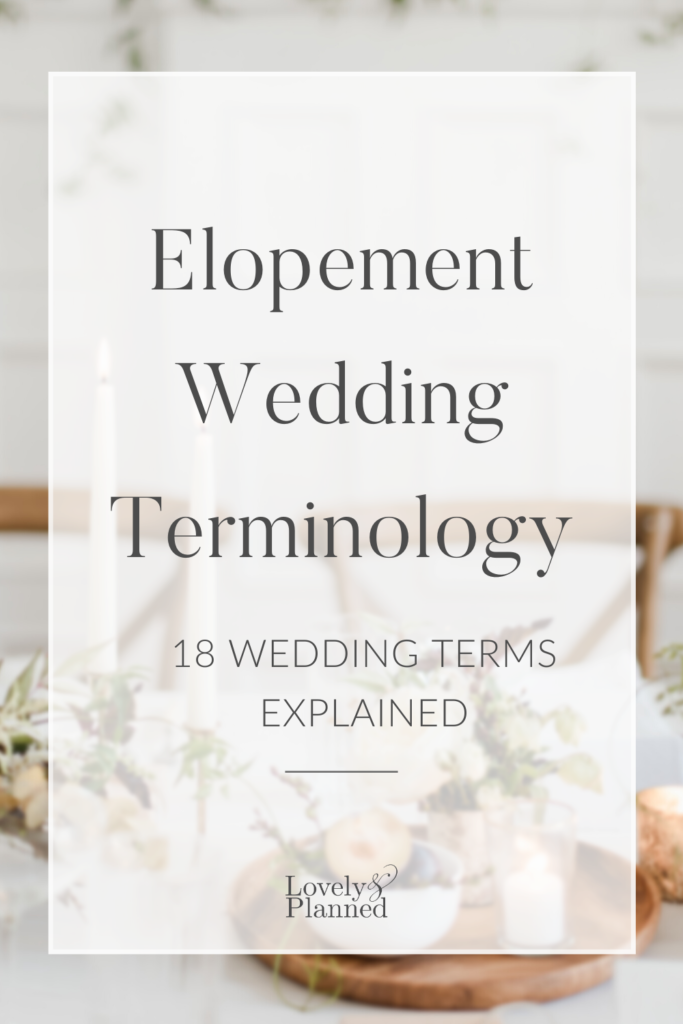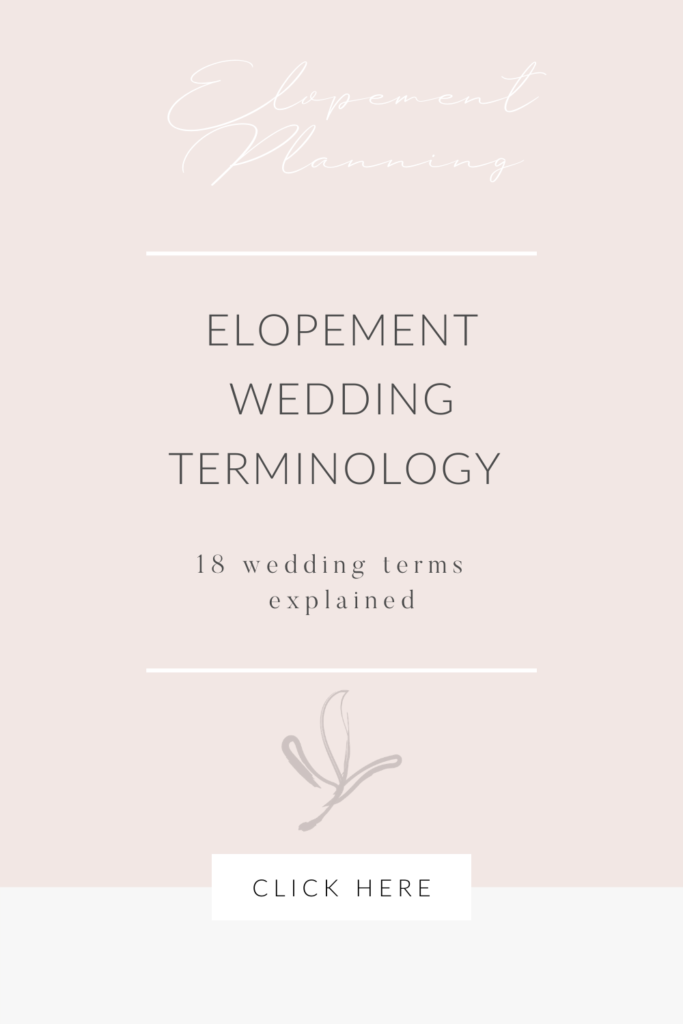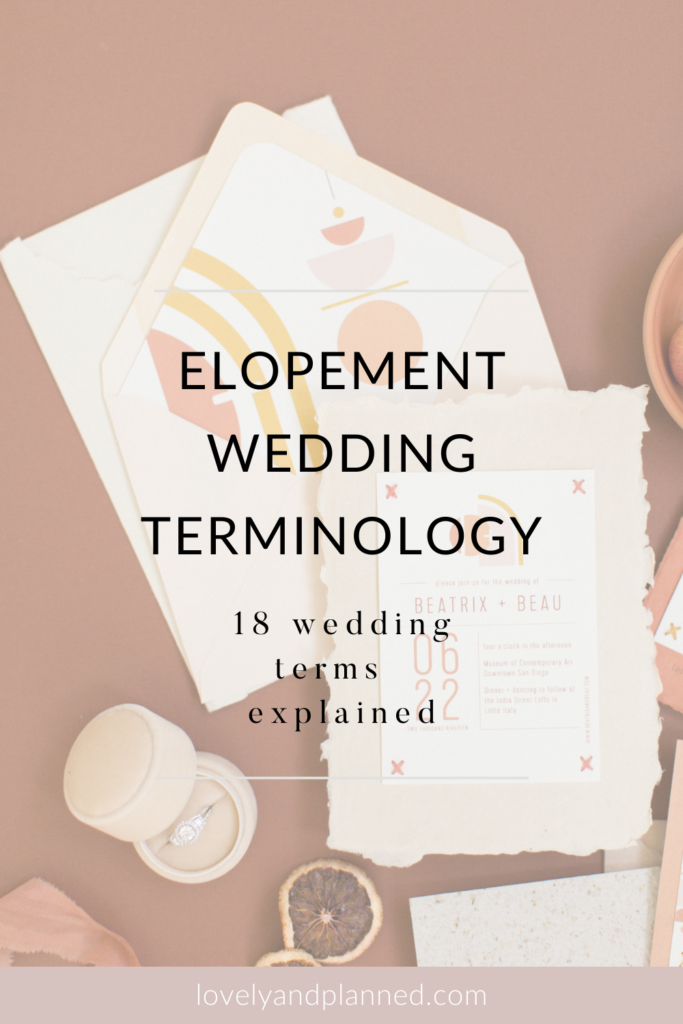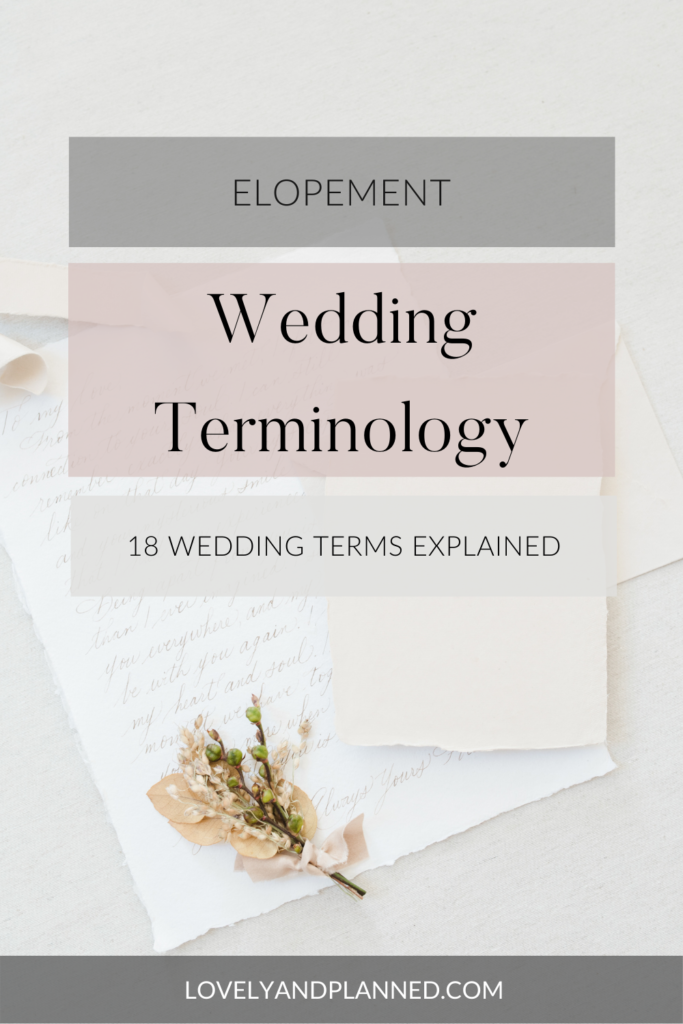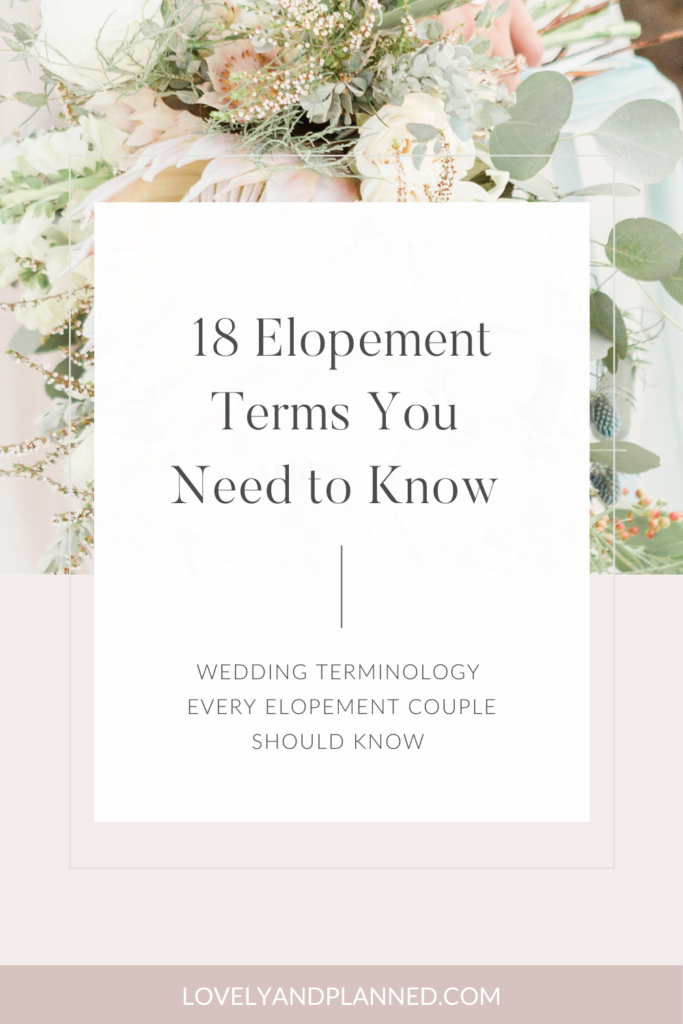Wedding blog
Elopement Glossary: 18 Wedding Terms You Should Know

As small ceremonies have become increasingly popular in the last few months due to the worldwide COVID-19 pandemic, it seems that new wedding terms keep popping up overnight.
Gone are the days when newly engaged either decided to elope or have a “proper” wedding. Now there are tons of options! How about a pop-up wedding, a minimony, or rather a micro wedding? If you have no clue what I’m talking about, trust me, you are not alone!
So, in this blog post, I’ll explain the most common wedding terminology you should know if you are planning a small, intimate wedding.
Most common elopement wedding terms
Anniversary Reception: to celebrate with friends and family on or close to the anniversary of the original elopement or minimony
Civil Ceremony: legally binding ceremony
Elopement: this term has evolved a lot over time. It no longer only means to secretly run off to get married without the permission of the couple’s parents but it rather describes a beautifully scaled-down wedding only with the couple, maybe their witnesses, and an officiant.
Elopement Package: elopement packages are usually all-inclusive solutions for a wonderful, stress-free wedding. Depending on who offers the package, they typically cover everything needed for a wedding day. For example, at Lovely & Planned our elopement packages include the complete organization, decoration, and styling of the elopement. This includes a small floral package, a wedding officiant, a cake, and many more details. The most significant advantage besides a stress-free planning experience is that the couple knows exactly how much their elopement is going to cost, without any hidden surprises.
Hybrid Wedding: a hybrid wedding is a combination between an in-person wedding and a virtual live stream. This type of wedding is an excellent choice if not everyone invited to a wedding can attend due to travel restrictions.
Marriage License: a legal document that needs to be obtained before the marriage. The couple, the officiant, and their witnesses need to sign it during or after the ceremony. Once the license is signed, the marriage certificate is issued.
Micro Wedding: a micro wedding is a small, intimate wedding with anything between an elopement and 50 guests. Usually, micro weddings focus on incorporating exclusive details.
Minimony: is short for a (legal or non-legal) mini ceremony. It’s only for the couple and their closest friends and family. Typically not more than ten people. Couples who decide to have a minimony often have a larger, more traditional anniversary reception or sequel wedding in the future.
Mini Wedding Cake: also called tiny wedding cake, petite wedding, or elopement cake. They can be a one-tier or two-tier wedding cake, often incredibly beautifully decorated. It has also become popular during the pandemic to serve a mini wedding cake to each guest.

Pop-Up Wedding: usually quite a spontaneous wedding that doesn’t involve a lot of planning. Often only a short ceremony with a handful of guests and no reception afterward. Some wedding planners offer pop-up wedding services. They rent a venue, decorate it, and organize an officiant. The couple can then book a ceremony spot – usually 30 minutes to an hour. Because the couple “shares” the venue and the officiant with other couples, pop-up weddings tend to be a lot cheaper than traditional ceremonies.
Sequel Wedding: a second wedding celebration after a smaller wedding or minimony. Sequel weddings have become very popular during the pandemic. Couples who get legally married with only a few guests decide to have a larger, more traditional ceremony and reception with their friends and family later on.
Symbolic Ceremony: a non-legally binding ceremony. Couples who have a destination elopement often need to get legally married in their home country either before or after eloping. Because oftentimes, non-residents can’t get legally married in a specific country. Symbolic ceremonies are as beautiful and soul unifying as civil ones and often part of sequel weddings.
Wedding Hashtag: is a unique hashtag created for the wedding. They have become increasingly popular during the pandemic as they allow guests and those who weren’t able to attend to share and browse images.
Wedding Livestream: allows guests to attend the wedding ceremony in real-time virtually. This is either possible through full-service platforms especially created for wedding live streams or any other video streaming provider such as Zoom or Instagram Live.
Wedding Website: having a wedding website is an easy way to keep all the wedding information for guests in one place. It should include the basic information such as the date, the time and the venue details. For destination weddings, it can also function as an all-in-one resource for guests. This could include advice on accommodation, general tips about the destination, flight information, and even more specific tips about the location and the venue.
Bonus: Wedding Planner vs. Day-Of Coordinator vs. Venue Coordinator
These three wedding terms often create confusion not only during the pandemic. So here is a quick explanation:
Wedding Planner: a wedding planner takes care of the wedding from the beginning to the end. This includes creating a wedding concept, recommending vendors and venues, negotiating with vendors, managing budget, assisting with hotel bookings for guests, mailing invitations, managing RSVPs, handling the day-of coordination, and many more things.
Day-Of Coordinator: day-of coordinator coordinates the details and logistics of the wedding day and ensures that everything comes together exactly as planned. They are the point of contact for vendors and they create and oversee the day-of timeline. Usually, a day-of coordinator starts to work with a couple around six weeks before the wedding.
Venue Coordinator: a venue coordinator works for the venue. They will answer any questions related to the venue and help with all the organization concerning the venue. However, they do not manage any other details such as vendor coordination and management, or creating a wedding concept.
I hope you find this list with the most common elopement wedding terms helpful! If you have more questions or like to find out how I can help you plan your dream elopement, get in touch with me to set up a complimentary consultation!
Love, Michaela
Related articles you might also like
- How to Plan Your Wedding During Social Distancing
- Top 5 of the Most Common Elopement Questions Answered
- Just the Two of Us – The Myths about Elopements
